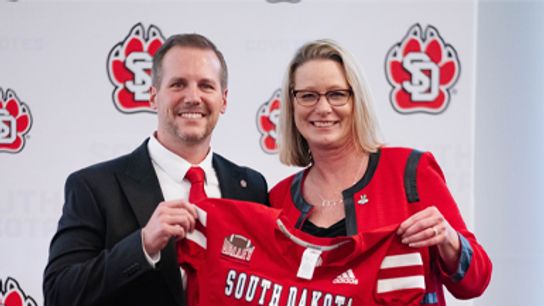The University of South Dakota was out.
Not happening. Was fully intent to NOT opt into the House Settlement that U.S. District Court Judge Claudia Wilken formally approved June 6.
Then, not only did the settlement get its long-awaited legal gavel of approval, but Wilken -- despite both sides having consented to roster amendments -- used her bench to protect the thousands of student-athletes who could have been left without an athletics home.
South Dakota's Jon Schemmel explains how the House Settlement and grandfathered-roster spots work.
Hint: The latter of those is transferrable for student-athletes.
Schemmel, nearing completion of his second full year atop the athletics department at South Dakota, conducted a masterclass in transparency during a 45-minute conversation with John Thayer on the university's YouTube Channel. Schemmel said initial terms of the deal -- which would not have preserved roster spots -- was a nonstarter for the Coyotes.
"Initially, when they talked about the settlement terms, there were no exceptions for grandfathering in rosters," saiid Schemmel, a former Major League Baseball selection who spent time with both the New York Mets and San Diego Padres organizations. "So what they meant for us if we did opt in is we would essentially be immediately in the position to cut at least 50 student-athletes; I think 52 was the math that we did. ...
"That was our biggest hangup the whole time, was just the roster limits. Not only for athletics and not wanting to cut kids that don't deserve to be cut but also enrollment. Fifty kids is a lot of kids on a campus these days. ...
"When the final settlement came through and we knew we could grandfather in, not only then could we grandfather those student-athletes in, but if you missed the date to opt in, you cannot -- you're not allowed to grandfather in. So the best way to protect our student-athletes right now was to opt in."
He added, "We were never going to opt in if we had to cut anyone."
While Schemmel and USD made the proactive move to opt into the House deal -- which allows schools that join to revenue-share up to $20.5 million but does not require a minimum revenue-sharing dollar amount -- he revealed something that perhaps hasn't received enough attention.
A student-athlete in any sport who receives the "grandfathered" designation is then free to transfer -- pending eligibility to do so -- to any other institution and maintain that "grandfathered" status. He used an arbitrary example of a sport that had to eventually carry a 15-person roster but that might currently have 20 athletes on its active roster.
"The designation is actually owned by the student-athlete," said Schemmel, who noted the NCAA has established guidelines for which players in any sport can be designated as having a "grandfathered" roster spot. "Once you receive the designation of a designated student-athlete above that [future] roster [limit], so in that example there would be five student-athletes, those five student-athletes would actually own that designation.
"So, what that would mean is a lot of student-athletes would view that as a positive because they would say, 'Well, i can go anywhere in the country now and not count against anyone's roster limit.'
"As the years go forward, we can't designate anybody else; if they leave [as a grandfathered student-athlete with eligibility remaining], we can't replace them. No matter what, in a three- or four-year period, we'll be at the roster limits allowed by the House Settlement."
Acknowledging his university's approximately $25 million total athletics budget, Schemmel also admits that South Dakota's third-party collective is likely headed for extinction. He is urging potential donors to treat it that way right now -- echoing a similar sentiment around college athletics that signals the potential doom of third-party collectives, many of whom have representatives acting as player-agents that he doesn't believe are acting in forthright methods.
"Hopefully this can crack down on some agents, too," Schemmel said. "There's a lot of good ones out there doing a lot of great work, but there are a lot of really, really bad ones doing a lot of really slimy things."
Schemmel says money donors now give directly to USD through its various fundraising programs or in-house Name, Image and Likeness can be directly channeled to respective sports, allowing the school to use its revenues for revenue-sharing and replenishing those funds, in part, with donations.
